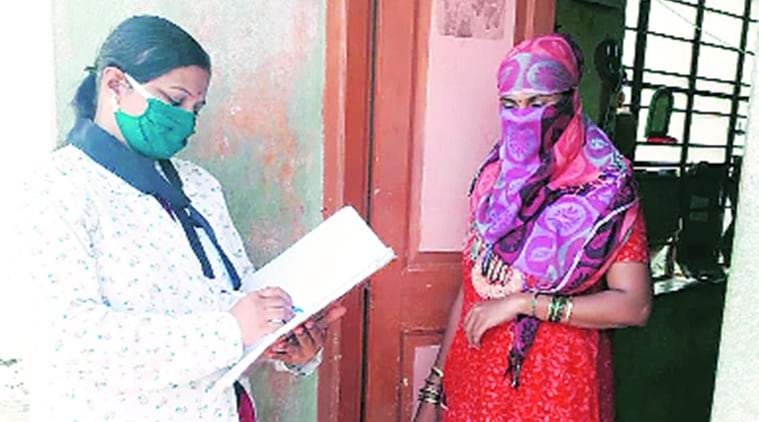 An ASHA on Covid-19 duty.
An ASHA on Covid-19 duty.
In March, Swati Patil, an accredited social health activist (ASHA), was handed over a white cotton mask by the health department. Armed with it, she started making door-to-door visits at Mangrul village of Jalgaon to check on migrant workers, who have returned home, and senior citizens and makes a note if any have developed cough, fever, or cold and have diabetes and hypertension. She receives Rs 33 per day for the Covid-19 survey, roughly 50 paise for each of the 60-70 houses she visits on a day.
“So far, our village has no novel coronavirus case, but in nearby Parola town there are several cases. I visit so many houses, I am afraid one day I may catch this infection,” she said. In March, district health office had also given her one-litre sanitiser, which is now over.
ASHAs, like Patil, are worried to be at the frontline of the fight against Covid-19 with a few safeguards. In Solapur, seven ASHAs have tested positive for the virus, one each in Satara and Ratnagiri. Some are offered just masks, some masks, and gloves, and a very few in the municipal corporation areas are provided personal protective equipment (PPE) kits.
Pushpa Mane, an ASHA in Solapur, said the number of containment zones have increased over the last fortnight in the district, putting health workers at risk. “ASHAs live in a containment zone and work there. Seven were diagnosed positive 10 days ago,” Mane said. They were each given one PPE kit two months ago. “We wash it every afternoon and reuse it next day. I am using one kit since the last two months. How will it protect us?” she asked.
As Covid-19 cases surge in rural areas with return of migrants, the state government has deputed ASHAs to conduct their screening and refer those symptomatic for the disease to quarantine centres.
“We are the first ones to meet migrants at their home. The government has asked us to keep a distance. There is no other training apart from that,” said Netradeepa Patil, an ASHA in Kolhapur. Patil says ASHAs have been assaulted at least four times by local villagers when they went to enquire whether any migrant had returned from a red zone and if they were observing home quarantine. “We had to file a police complaint. We are working in fear,” Netradeepa said.
The central government has announced Rs 50 lakh health insurance if any frontline worker dies due to the virus. “But ASHAs need more than insurance when they die. Gloves are randomly distributed, some have not received it yet,” said Raju Desle, state president of the All-India Trade Union Congress (AITUC).
According to Dr Archana Patil, Additional Director in Directorate of Health Services, since ASHAs are not directly involved in quarantine or Covid-19 wards they do not require an N-95 mask. “A cotton mask is an adequate protection,” she said. ASHAs, however, argue they visit multiple houses and remain at the risk of getting an infection. “We have family members at home, who are also at a risk because of us. The government is offering poor financial incentives for us to step out and take that risk every day,” said Suvarna Patil, an ASHA in Sangli.
“Every health work in rural regions is expected of us. We work for 10 hours. We also have to take care of pregnant women and infants as well,” Patil said.